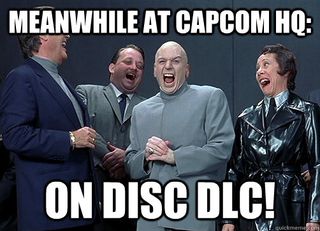Why On-Disc DLC Is As Bad A Crime As Gamers Make It Out To Be

There seems to be this sort of nonchalance about the way publishers have been handling the video game industry lately. It's devolved into a race to the bottom for who can churn out the most “broadly appealing” title while having as many monetary nickel and diming schemes as possible, to boost revenue and hopefully turn a profit. One of the biggest and more deplorable schemes happening right now is something called disc-locked content or on-disc DLC, a method that locks finished content behind a pay-wall on a full priced retail disc, requiring additional funds to unlock said content. Recently, Ars Technica wanted to quell some of the vitriol surrounding gamers' perception of on-disc DLC or disc-locked content claiming that it's not that big of a deal.
So basically, Ars Technica writer Kyle Orland wrote a somewhat middle-of-the-road piece about on-disc DLC not being as bad as people are making it out to be, following the recent fallout over Resident Evil 6's on-disc DLC discovery, which nearly had pitchforks and torches out all over the place.
Orland also claims that there are justifiable reasons for disc-locked content in games, even though we've gone through several generations of gaming without it and have had games made of impeccable quality without the need for any DLC at all (i.e.,GTA: San Andreas, Baldur's Gate, Anachronox, Shadow of the Colossus, etc., etc.)
But let's be real here and ask the obvious question: If you have finished content that's done and certified on the gold master disc why are you locking it away if the game is not free-to-play or budget priced? Locking away more than $110 worth of content on the Street Fighter X Tekken disc was completely unacceptable and a slap in the face to gamers. What sort of moron actually defends wanting to pay more for standard features that are common features in every other gameplay experience out there?
In fact, even Namco Bandai veteran and Tekken producer Katsuhiro Harada felt disc-locked content -- especially for key features such as fighters and stages -- was wrong on many levels and opted to include as much free DLC as possible for Tekken Tag Tournament 2 to off-set the bad press fighting games had received due to the Street Fighter X Tekken fiasco.

One of the common arguments on behalf of on-disc DLC or disc-locked content is that it's easier for gamers to access the goods and removes the need to download anything other than an access key. The other argument is that on-disc DLC is done by a separate team on a separate budget, thus it justifies a separate price (take note that this is just a rumor and in the cases where on-disc DLC was discovered, the guilty party has never publicly admitted or proved the content was on a separate budget.)
Plain and simple: If content is finished in time for certification and ships with the master gold print for manufacturing, there's no reason why it couldn't be included with the game from the start. It's obvious it's a cash grab, even Michael Pachter admits it looks plain greedy that certified content is withheld from consumers just to make more money.
CINEMABLEND NEWSLETTER
Your Daily Blend of Entertainment News
If DLC is designed by a separate team on a separate budget but it's finished in time for certification does that mean gamers should also pay for out-sourced material such as art, additional sound cues and cinematics that were done on a separate budget by a separate team? Now we're getting into meta-pricing for video game costs. How much of what's not part of the original design, coding or certification should gamers be paying extra for? Most companies contract third-party studios to put together cinematics, so should those have an extra $5 price tag since it was designed separate from the main game? What about concept art or tech demos? These sometimes appear on game discs as extras...should we pay extra to even view them? Do you see how ridiculous this line of thinking gets?
When you get into the disc-locked content debate, it usually boils down to why the content has to be locked in the first place. Heck, even developers admit that some games purposefully have content cut away for monetary purposes, as exposed by Paradox Interactive's senior producer Gordon Van Dyke in his interview with Rock, Paper, Shotgun...
“Sometimes day-one DLC is [content that was cut from the final game],” ... “To be honest, sometimes it really is. It does happen for pre-order stuff, because sometimes you don’t have the time to make that extra content. But other times, a studio might have a completely separate team, and they’re off on their own. But the end consumer doesn’t understand that – nor should they have to.”
In reality, the debate about disc-locked content or on-disc DLC is a battle between those who don't understand gaming culture and don't see it as a bad thing and those who do understand gaming culture and don't like the idea that games are being cut up piecemeal for bottom lines and profit margins.
When someone like Ars' Orland writes as if on-disc DLC is not that bad a thing or has some sort of reasonable paradigm behind it other than greed, we can easily see that this isn't someone who plays games often enough to be considered a hardcore gamer. It's the very reason why the FGC had a furor when they found out about the locked characters on the Street Fighter X Tekken disc, meaning that they would have to pay extra to play as their favorites.

It's also the same reason why BioWare fans threw a fit when they found out part of Javik's files were already complete and playable on the Mass Effect 3 disc save for his mission and sound files meaning that they would have to fork over cash to find out the rest of the game's lore, and it's the same reason why gamers were pissed when Deep Silver patched in a block on already accessible content in Risen 2 for content they already paid for and had access to.
As mentioned, if you're not a core gamer then you won't mind that you would have to pay to reload a clip in a first-person shooter. And if you're not a real core gamer you wouldn't mind that part of a game's story is already on the disc but locked away behind a pay-wall or that specific characters in a tournament fighting game have a $20 price tag while a competing game lets you unlock fighters simply by playing the game and unlocking stuff the old fashioned way.
Diluting a game with on-disc DLC just to nickel and dime doesn't grow or evolve or enhance the gaming industry, it just lines the pockets of publishers and makes gamers feel as if they've been tricked into a shady deal where they're getting less than what they thought they were paying for.
It should also be noted that attackers of on-disc DLC are long-time gamers and defenders of on-disc DLC have only really gotten into gaming this gen. We're looking at content that was common in the generations before but is now being removed and re-added with a price-tag this gen. That's not to mention that technology makes it easier than ever to design content, heck even Gearbox admitted that they can pump out DLC for Borderlands 2 in a matter of hours thanks to the Unreal Engine's design hooks.
Many may claim that those who haven't embraced on-disc DLC are a “vocal minority” but we're the core gamers who live, eat and breathe games. We've been playing games since they've been on tape drives and growing with our favorite titles, brands, characters and franchises as they made the transition from text to 2D and 2D to 3D, and we're vocal because we're trying to preserve what little integrity the video game industry has left.
Staff Writer at CinemaBlend.
Most Popular








